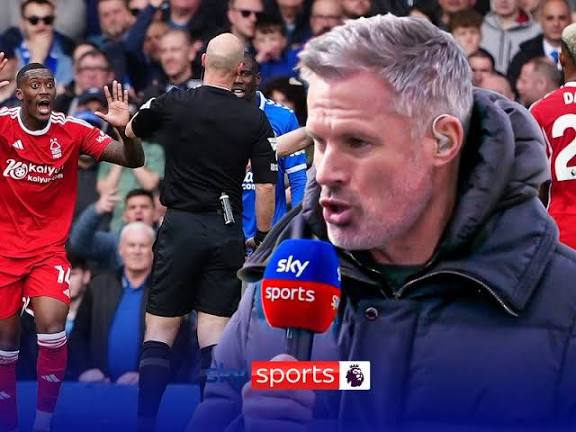Mark Clattenburg says VAR made a big mistake in Liverpool 3-2

On a cool European night at Anfield, Liverpool and Atletico Madrid served up a Champions League clash full of drama, emotion, and controversy. It was a night where the roar of the Kop, the tactical chess match between Arne Slot and Diego Simeone, and the unpredictable nature of football combined to create a story that will be remembered for years to come. Yet, in the midst of Liverpool’s thrilling 3-2 victory, the biggest talking point wasn’t just Virgil van Dijk’s last-minute winner, but rather a controversial VAR decision that left pundits, fans, and even refereeing legend Mark Clattenburg shaking their heads in disbelief.
The atmosphere was tense long before kickoff. Liverpool, the reigning Premier League champions, had been desperate to start their European campaign on the front foot after last season’s disappointment. Atletico Madrid, meanwhile, had a point to prove after a slow start to their domestic campaign. The Anfield crowd was electric, waving flags, chanting songs, and reminding the visitors that this was no ordinary ground. Every touch of the ball was greeted with cheers or groans, and every refereeing decision was scrutinized by tens of thousands in the stands and millions more watching worldwide.
The match began with intensity, as both sides looked to establish dominance. In the first half, Liverpool thought they had the perfect chance to take control when referee Maurizio Mariani pointed to the spot after Jeremie Frimpong’s cross struck the body of Clement Lenglet inside the box. To the naked eye, it looked like handball, and Anfield erupted in anticipation of a penalty. But VAR intervened. After a brief check at the pitchside monitor, the decision was overturned—the ball had struck Lenglet’s hip, not his arm. Relief for Atletico, frustration for Liverpool, and an early reminder that VAR was going to have its fingerprints all over this match.
But that was only the beginning.
Just before halftime, Atletico Madrid struck. Marcos Llorente, the tireless Spanish midfielder, found himself in space and poked the ball beyond Alisson Becker in stoppage time. At first glance, it seemed like a well-taken goal, and the Atletico players celebrated wildly. But as Liverpool fans and players looked closer, they saw something that didn’t sit right: Antoine Griezmann was standing in an offside position, right in front of Alisson. The Frenchman had made a slight movement, raising his foot as the ball went past, and Alisson immediately protested that his view had been obstructed.
The Kop howled in fury, waving arms and screaming at the officials to intervene. Surely VAR would disallow the goal? Surely they would see what Alisson saw—that Griezmann’s positioning had interfered with his ability to react? But after a tense wait, VAR allowed the goal to stand. Atletico equalized, and the decision left Liverpool stunned.
This was the moment that brought Mark Clattenburg into the debate. The former Premier League referee, who has overseen Champions League finals and countless high-profile fixtures, watched the incident closely and offered his verdict after the game. Speaking exclusively to TBR Football, Clattenburg didn’t hold back.
“Atletico Madrid were awarded a goal just before half time and it has a suspicion of offside,” he explained. “Antoine Griezmann is clearly in an offside position close to the goalkeeper. For an offside to be called, Griezmann has to be in the line of vision of the goalkeeper or affecting his ability to play the ball. In my view, he was doing exactly that. He was very close to the line of the ball, he made a gesture, and that – in my opinion – affects Alisson’s ability to save it. The goal should have been disallowed.”
Clattenburg went further, suggesting that VAR’s interpretation of the law had been too lenient. “My only opinion on why the goal was allowed to stand was that the VAR believed Griezmann did not affect the goalkeeper’s ability to play the ball and was not in his line of vision. But I believe football as a whole would expect this to be offside.”
For Liverpool, it felt like déjà vu. This wasn’t the first time VAR had gone against them in a crucial European match, and the sense of injustice added extra fire to their performance. Atletico, buoyed by the goal, nearly took control in the second half. Marcos Llorente struck again in the 81st minute, silencing Anfield and sparking scenes of jubilation on the Atletico bench. At 2-2, it looked like Simeone’s men were going to steal a point, perhaps even more.
But Liverpool’s spirit has always been about fighting until the very last second, and that night was no different. In the 92nd minute, with the Kop sucking the ball towards the goal, Virgil van Dijk rose above everyone else and powered home a thumping header. Anfield exploded. Players piled on top of each other. Fans hugged strangers. Van Dijk’s goal not only secured victory but also restored justice in the eyes of many supporters who felt wronged by the earlier VAR controversy.
After the final whistle, the post-match discussions weren’t only about Liverpool’s resilience or Van Dijk’s heroics, but about officiating and the role of technology in football. Was VAR helping the game, or was it simply adding more layers of confusion? Why had the referee not been called to the monitor for the Llorente goal, just as he had been earlier for the penalty incident? These were the questions being debated in pubs, living rooms, and TV studios across Europe.
Mark Clattenburg’s comments added weight to the argument that VAR still has flaws. With 297 Premier League matches and a Champions League final on his resume, his words carry authority. If someone of his experience believed it was offside, many fans felt vindicated in their anger. “Football would expect this to be offside,” he repeated, a simple statement that summed up the feelings of thousands of Liverpool supporters.
The controversy also reignited the age-old debate about the “spirit of the law” versus the “letter of the law.” Technically, VAR officials may have believed Griezmann wasn’t interfering. But in reality, with him so close to Alisson and making movements towards the ball, how could he not have been? Fans argued that the laws of the game needed more common sense applied, rather than rigid technicalities
For Arne Slot, the result was more important than the debate. Liverpool had won 3-2, taken three points in a tough group, and shown character once again. But even he couldn’t ignore the discussion. In his post-match press conference, Slot acknowledged that he too thought the goal was questionable, though he diplomatically avoided criticizing officials outright. “I think many of us saw what Alisson saw,” he admitted with a wry smile.
For Atletico Madrid, the controversy almost overshadowed their performance. Simeone’s men had fought hard, made life difficult for Liverpool, and nearly snatched a point at Anfield. But the debate about Griezmann’s positioning dominated headlines, taking attention away from their efforts.
In the end, Liverpool’s night ended in joy, but it was a joy tinged with frustration about the state of officiating. Football fans live for these dramatic moments, but they also crave fairness, and too often it feels like VAR is delivering the opposite. The Llorente goal will go down as one of those moments that will be replayed, debated, and argued about for years to come.
And perhaps that’s the real beauty and curse of football—the fact that one moment, one decision, one raised foot in an offside position, can spark debates that outlive the match itself. Liverpool may have claimed victory thanks to Van Dijk, but the memory of Griezmann standing in front of Alisson, arms raised as the ball flew past, will remain a symbol of why VAR still divides the football world.
By the time the players left the pitch and the lights dimmed over Anfield, one thing was clear: Liverpool had won the match, but VAR had once again stolen the show.















